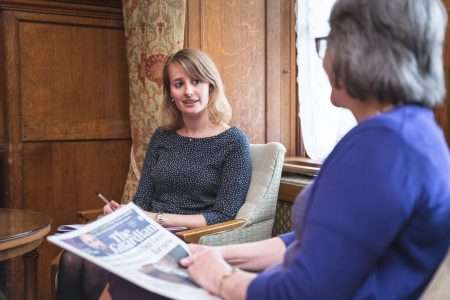What A Typical Day in Rehab Looks Like
Every patient is an individual and has different needs and requirements. However, there is common ground within all addiction treatment that can be incorporated in a ‘programme.’
Rehab Costs & Options for Alcohol | Drugs | Other addictions
When starting one of our addiction recovery programmes, people work with their therapist and consultant psychiatrists on their addiction and co-occurring issues that leads them to use or drink in the first place.
Our model is not a ‘one size fits all’.
However, within the first few weeks, all of the people we treat will undergo thorough biopsychosocial assessments, detoxification (if needed) and be introduced to individual therapy, group therapy and the main principles of our 12 Step Programme.
Our treatment models:
- Foundation – 5 weeks minimum: This is a solid base and starting point that stabilises your condition with medical care, detox and nursing care, engages you in therapy and introduces you to Steps 1-5. It’s important to note that progression is not automatic and it’s recommended that patients undergo a further assessment that will establish whether they need to progress into Advanced Programmes to target deeper issues. See more.
- Advanced – Additional 5 weeks: This part of treatment focuses on progressing recovery by practising new life skills and relapse prevention techniques. For this, you will be moved to our Recovery Gardens, where you and the recovery-orientated community will begin to work on deeper-rooted emotional concerns. Here, we use advanced therapy work to help target dual diagnoses and other mental health needs. Discover more.
- Aftercare/Continuing Care (Telehealth): This is our continuing care programme that serves the needs of people in any location who are recovering from alcohol, drugs and other co-occurring disorders. Usually, these have recently completed treatment at Castle Craig. We use online platforms to deliver ongoing support and a range of addictions therapies to those in early recovery at home. Learn more.
Request a free addiction assessment.

What does a typical week look like in rehab?
It’s difficult to put a set timetable of “weeks 1, 2, 3, 4 & 5” because everyone recovers at a different rate. Some will quickly embrace the 12 Steps and make quick progress, while others move more slowly.
“You get better at the rate you get better.”
Detox is often the first step
Often, depending on the severity of the addiction, the first week can include detox, where you have full medical support to help you through the body’s response to withdrawal from your addictive substance.
While detoxing, patients gradually participate in programme activities.
Once detoxed, patients can join the programme fully. The programme surprises most people when they arrive because it is busy and that is good because it helps them re-learn how to focus the mind and cope with cravings. More.
A quick overview of how the day is planned out:
- Early Morning: These begin with an early mindfulness session, a visit to the nurses at the medical centre, and a healthy breakfast. Sleeping in is not part of the programme, you can expect packed days with programmes beginning early in the morning to get your mind into a relaxed, positive state to start the day. The main part goal is to introduce a manageable simple routine that creates healthy habits. The morning usually provides the most intensive part of your day.
- Late Morning: Psychoeducational talks by therapists or educational documentaries are presented. These sessions will help you recognise certain patterns of behaviour and triggers so as to avoid relapse post-treatment. After the presentation and a short break, it’s time for group therapy. It is these daily group meetings, led by a therapist, that will probably help you the most. They may seem challenging at first but as you learn to participate fully, you will discover truths about yourself and your addiction that will help you turn your rehab visit into a time of self-discovery and opportunity. In a safe, therapeutic environment you will listen to others, identify with them and support them. They will do the same for you.
- Afternoons: After some lunch, a chance to relax and go for a walk. You will soon be able to enjoy health and, fitness. Later, you can expect group therapy workshops, specialised sessions for co-occurring disorders such as trauma and grief, or behavioural addictions such as gambling, and individual therapy sessions. Family therapy can also be introduced here. As the afternoon progresses, more alternative therapies can be included, such as art or music therapy, drumming, equine therapy, hyperbaric oxygen, massage and or certain relaxing exercises. At the same time, your therapist will have given you assignments, like homework, for you to prepare for your next session. It’s important to take time to do these.
- Evenings: After dinner, there may be 12 steps/NA/AA meetings and self-reflection periods. The evenings can also involve short group sessions intended for people to share and for example, process feelings of shame and guilt.
The day will end usually around eight in the evening or nine, leaving you some free time and a chance to reflect and settle down. If you are having trouble sleeping you might receive some acupuncture from a trained nurse.
Examples of timetables for two of our programmes
| Time | Activity |
|---|---|
| 07:30 | Morning Reflection |
| 09:00 | Lecture: Challenges of Stress in Recovery |
| 09:45 | Group Therapy |
| 11:00 | Gym |
| 12:00 | Lunch |
| 14:15 | Individual Therapy |
| 15:00 | Specialist Group or Relaxation (i.e. Yoga) |
| 16:00 | Recovery Workshop: Mindfulness |
| 18:00 | Equine Therapy / Complementary therapy |
| 19:00 | Cocaine Anonymous Meeting |
| 20:30 | End of day reflection |
What can you expect from our rehab programme?
- Therapy and counselling sessions: Both individual sessions and group counselling sessions are provided regularly. These will be crucial in helping people to express themselves, face reality and take responsibility for their recovery. Sessions are led by a trained therapist to ensure safe and appropriate procedures.
- Educational programmes: These are designed to teach you about the disease of addiction and what you can expect during your treatment and continued recovery.
- Life skill training sessions: You will learn and practice the vital recovery skills and coping methods needed to meet the challenges of a life lived in a new manner.
- Nutrition planning: Physical health is important during your stay and will help you with your ongoing recovery. Structured meal times and balanced diets are a big part of an overall addiction programme. Acquiring healthy eating habits enhances wellbeing.
- Fitness regimes: Structured exercise programmes are designed to keep individuals active, healthy and happy. Exercise can be a great way to curb cravings and improve moods.·
- Complementary therapies and holistic techniques: Here at Castle Craig, we have amenities such as spa treatments, massages, acupuncture, hyperbaric oxygen and much more. We are also able to offer specialised therapies such as therapeutic art and equine therapy, to balance the mind and body.
- Support group meetings: These are in-house fellowship meetings with your peers following the 12 Step model first proposed by alcoholics Anonymous.. Using the principles of honesty, openness and willingness to change, such groups build trust, fellowship and self-esteem through the simple process of sharing their experience, strength and hope. They represent one of the most successful and powerful aids to recovery ever devised.
- Family programmes: Addiction is a family disease and family involvement is vital. Some education on the nature of addiction and its treatment is usually helpful. Where family members are able to discuss openly and honestly their issues over past behaviour and the way ahead, then the recovery journey will be a lot easier.
Get help today
One thing you can rest assured with us here at Castle Craig is that we care – we want you to thrive and become the best version of yourself. Many of us have experienced what you are experiencing and we know that it works if you want it to.
We’ve had decades and decades of experience in helping people suffering from addiction disorders as well as many other mental health problems. We’ve always accepted the challenge of helping people when they cannot help themselves because we believe that all life is important and it’s worth saving.
Let us be the hand that guides you back home. Call 01721 546 263.
How we encourage the recovery process:
Peer support is a huge part of the recovery process – everyone here is in the same boat as you are, and people who have been here for 5-8 weeks pass on their knowledge of their process to empower people who are in their first and second week
When you’re in detox in our specialist detox unit, you have a group of people around you who are going through it themselves or have been through it in the past few weeks
They help each other, support each other, and sometimes build resilience to each other. This helps people progress, and move through the 12 steps until they’re at the point where they’re ready to leave.
Some people aren’t ready to leave at 5 weeks, and extend their stay and move into our advanced programmes where they continue to target trauma and other issues and learn enhanced coping skills and life skills.
Many people are reluctant to do more than 4 weeks when they call us, but when they start on the programme they start to understand the benefits of staying longer and stay for many more weeks.



